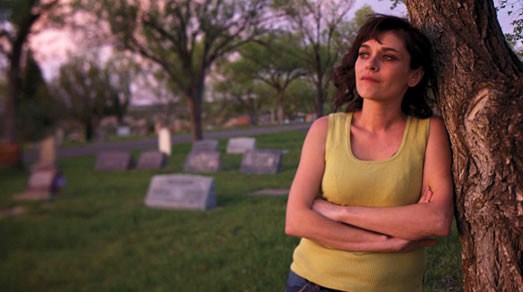Born in Jamaica and raised in Puerto Rico and the Dominican Republic, social and environmental issues pervade Suzan’s work. Her films have appeared on National Public Television and on the Documentary Channel, at Lincoln Center, and at many festivals. Her film, Bag It (2010), was honored as a finalist at the Puma Creative Impact Awards in Berlin and has been televised in over twenty countries. Her current project, Uranium Drive-In, is a recipient of Sundance Institute and Chicken and Egg funding and was featured at both Good Pitch and Hot Docs Pitch Forum. [Press materials]
Uranium Drive-In will play at DOC NYC on November 15.
Women and Hollywood: Please give us your description of the film playing.
Suzan Beraza: Uranium Drive-In follows a proposed uranium mill in southwestern Colorado — which would be the first to be built in the U.S. in 30 years — and the emotional debate pitting a community desperate for jobs against an environmental group based in a nearby resort town. Without judgement, the film offers no easy answers but aims instead to capture personal stories and paint a portrait of the lives behind this nuanced and complex issue.
WaH: What drew you to this story?
SB: I live in Telluride, Colorado, the resort town that is opposing the uranium mill. I began to follow the issue of the proposed mill as meetings and debates began outlining the pros and cons. It almost seemed as though an invisible line had been drawn in the region separating those for and against the mill. After spending two years in this community really getting to know people and why they so desperately wanted the mill, I grew to understand that the issue wasn’t nearly as black and white as I had originally assumed.
WaH: What was the biggest challenge in making the film?
SB: One of our biggest initial challenges was earning the trust of the townspeople, especially being that most of our crew was from the archenemy town, Telluride. Once we spent some time in the community we were slowly able to gain their trust. As documentary filmmakers we want to give a voice to those who are not being heard and are underrepresented in media. We try to portray people who we interview as fairly as possible, allowing their concerns to be heard. A big part of it is listening — being open and respectful. People really want to tell their stories if they feel they will be told with honesty and compassion.
WaH: What advice do you have for other female directors?
SB: As a female documentary filmmaker I really don’t believe that there is much gender discrimination going on in the documentary world. However, in the narrative film industry I feel that there really is a gender bias towards men. A recent study done by the Sundance Institute and Women in Film has been a huge eye-opener in pointing out this disparity.
WaH: Whats the biggest misconception about you and your work?
SB: Because my past work has tended to lean strongly towards advocacy, I think that audiences will be surprised by our approach with Uranium Drive-In. The film is character-driven, unbiased and ultimately much more balanced.
WaH: Do you have any thoughts on what are the biggest challenges and/or opportunities for the future with the changing distribution mechanisms for films?
SB: I would say that the new distribution models give filmmakers more control and independence. This also means that as a filmmaker, in order to make back your investment, you really have to put a lot of time and effort into your distribution. Gone are the days of signing your film away to a distributor who will do it all for you. Carving out rights to different distributors who excel in specific areas is becoming the norm.
WaH: Name your favorite women directed film and why.
SB: I was struck by the incredible beauty and artistry of Stories We Tell, directed by Sarah Polley.
Watch the trailer for Uranium Drive-In:







